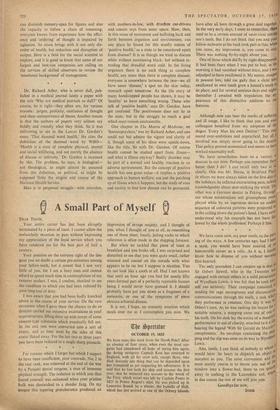A Doctor's Journal
Mother and Child
By MILES 'TOWARD THE quality of maternal care in the early years of life is of such paramount importance for the future well-being, both bodily and mental, of the individual that I am always glad to see any new contribution to our knowledge of the two- way 'interaction' between mother and child. Some weeks ago Dr. Frederick Stone of Glasgow made some shrewd comments in the Lancet on early disorders of the mother-child relationship. What, he asks, is to be expected of the normal mother? First, surely, devotion and enjoyment of her child. Next, protectiveness, and then a reason- able consistency of attitude. She should respect her child as a separate person, and not make him simply an instrument of her own ambitions.
Much skill and practice are needed to observe, and record, the everyday interactions within the biological unity of the young child and his mother. One sort of disturbance Dr. Stone terms lack of contact : the toddler is exploring the surgery or looking at some toys, and the mother is telling her story to the doctor, but nothing happens between them. This is quite abnormal; the mother, even if worried, should be aware of those small signals of distress which the child in a strange and perhaps threatening environment will send out. Another sort is excessive maternal anxiety : the mother who is convinced that something is wrong with the baby, however much she is reassured. Her com- plaints may be vague, and the baby may be thriving, but her anxiety drives her from doctor to doctor, and clinic to clinic, when really it, is not the baby who is ill but she herself. Some parents may use terrifying threats to secure obedience; others, for reasons within themselves, make excessive demands that their children should be independent—one mother told Dr. Stone, 'As soon as my little girl could talk, at fifteen months, I would make her decide at breakfast how she wanted her egg—poached or boiled.'
Of course, children are , born with different degrees of sensitivity to the emotional pressures they meet. With the same kind of mishandling, one child may survive and another succumb' When the baby is vulnerable, sooner or later he will show upsets in crying, in sleeping, feeding and bowel function. Tension in the mother' relationship contributes to the causation of such ailments as eczema and wheezy bronchitis' Diagnosis of a disorder of mother-care has to be made on positive signs. It is an important diagnosis, because as a rule some action can be taken about the disorder, and illness in the child cleared up, or better still, prevented.
The medical research unit of the Institute of Directors has lost no time in going to work Its lively and energetic chief, Dr. Beric Wright' has compiled some notes on the health problea151 of directors in a small book that reads well and is admirably set out. His pungent comments on the way of life of the 'busy executive' should make some of them at any rate sit back and think' For instance, a man who is 'too busy' to take lli5 annual holiday should be pushed out of the office—it is likely that both his job and his pattern of living need investigation. Another' 'As much stress and strain is caused by frusta' tion as it is by overwork.' I entirely agree. In 3 great many people, in business and the prolre5' sions, 'overwork' is a symptom and not a cause of illness.
I suspect that the frustration Dr. Wright refers to is more often a product of rivalry and tensioe in personal relations than of the conditions work as such. Stress within the individual, manager level and above, must tend to increase' as he climbs the last section of the ladder. Veil his domestic and his working life begin to Wer. fere with each other : he takes home a brief-cash full of papers, his wife complains, he feels ht rt' is depressed next day and can't concentrate, 105 ground to a rival—and there goes the yid° spiral again. Diethelm showed some years ago that mud can diminish memory-span for figures and also the capacity to follow a chain of reasoning; everyone knows from experience how the effici- ency and 'ordering' of thought is impaired by agitation. So stress brings with it not only dis-. order of health, but reduction and disruption of output. Here is a field for the social scientist to explore, and it is good to know that some of our largest and best-run companies are calling on the services of skilled observers. to review the 'emotional background' of management.
* * *
Dr. Richard Asher, who is never dull, pub- lished in a medical journal lately a paper with the title 'Why are medical journals so dull?' Of course, he is right—they often are, for various reasons : jargon, prolixity, confusion of thought and sheer unimportance of theme. Another reason is that the authors of papers very seldom say boldly and roundly what they think. So it was enlivening to see in the Lancet Dr. Gordon's essay 'That damned word health.' He cites the definition of the damned word by WHO— 'Health is a state of complete physical, mental and social wellbeing, and not merely the absence of disease or infirmity.' Dr. Gordon is incensed by this. The problem, he says, is biological— not theological, as might almost be assumed from this definition, or political, as might be supposed from the origins and course of the National Health Service.
Man is in perpetual struggle—with microbes, with mothers-in-law, with drunken car-drivers and cosmic rays from outer space. How, then, in this scene of movement and buffeting back and forth between organism and environment, can any place be found for this woolly notion of `positive health,' as a state to be considered apart from disease? It is as though we tried to discuss white without mentioning black; hot without in- truding that dreadful word cold. In the living organism there is no such thing as complete health, any more than there is complete disease; everyone is somewhere between the two—we all have some 'disease,' a spot on the skin today, stomach upset tomorrow. As the life story of many handicapped people has shown, it may be 'healthy' to have something wrong. Those who talk of 'positive health,' says Dr. Gordon, have got confused. The positiveness does not lie in the state, but in the struggle to reach a goal which must remain unattainable.
One chapter in The Matrix of Medicine, on `Somatopsychies,' was by Richard Asher, and one could not but admire the vigour and clarity of it, though some of his ideas were upside-down, like the title. So with Dr. Gordon. Of course health cannot be studied apart from illness— and what is illness anyway? Bodily disorder may be part of a normal and healthy reaction to an adverse environment. But the concept of positive health has one great value—it implies a positive approach to human welfare; not just the patching up of illness when it happens, but the study of man and society to find how disease can be prevented.



































 Previous page
Previous page